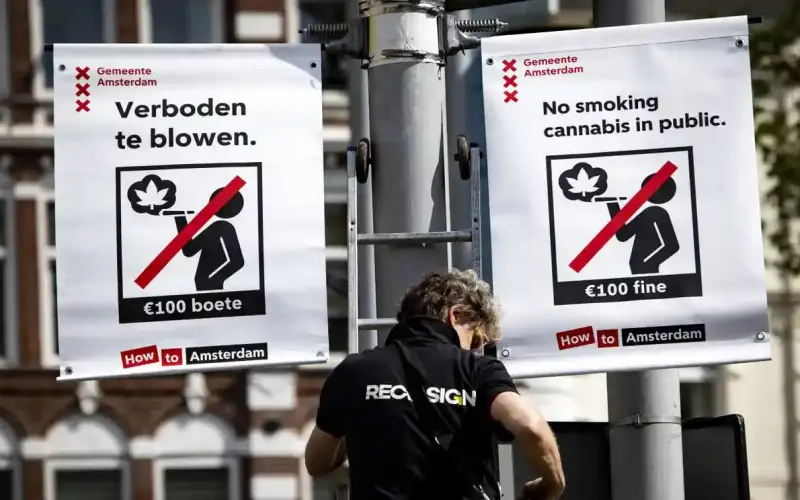Business
Pot Smoking Ban Takes Effect In Amsterdam’s Red Light District

A new era kicked off in Amsterdam’s Red Light District on Thursday, with a ban on smoking cannabis on the streets officially taking effect.
The ban is part of a city-wide effort, pushed by Mayor Femke Halsema, to make the famous area more hospitable to its residents and workers.
According to Reuters, signs “were posted in the canal-lined neighbourhood known for its brothels, sex clubs and marijuana cafes, which attract millions of tourists a year, but are a nuisance to residents.”
Those found in violation of the new law will face a €100 (or about $110) fine.
The law was proposed earlier this year by the Amsterdam city council.
“Residents of the old town suffer a lot from mass tourism and alcohol and drug abuse in the streets. Tourists also attract street dealers who in turn cause crime and insecurity. The atmosphere can get grim especially at night. People who are under the influence hang around for a long time. Residents cannot sleep well and the neighborhood becomes unsafe and unlivable,” the city council said in a statement at the time.
“A smoking ban on the street should reduce nuisance. We are also looking at a pick-up ban at certain times for soft drugs. If the nuisance does not decrease enough, we will investigate whether we can ban smoking on terraces at coffee shops,” the council added.
The city council gave final approval to the proposal earlier this month, setting the stage for Thursday.
According to Reuters, people “will still be allowed to smoke inside and on the terraces of coffee shops selling marijuana and hash in the district and other parts of the city.”
The pot smoking ban is part of an effort led by Halsema, Amsterdam’s first female mayor, to improve conditions in the Red Light District.
CNN reported in 2019 that Halsema had “presented four options aimed at protecting sex workers from degrading conditions, tackling crime, and reducing the impact of tourism in Amsterdam’s De Wallen red-light district.”
“Four scenarios have been proposed for discussion including closing the curtains on the windows so sex workers can’t be seen from the street, fewer window-style rooms, moving the brothels to new locations elsewhere in Amsterdam and the possibility of a sex worker “hotel” being created,” according to CNN. The plans aim to protect sex workers from gawking tourists and their camera phones, and also to combat a rise in abuses such as human trafficking. The four proposals will be discussed with sex workers, residents and businesses in July, before being taken to the city council in September. The plans will ultimately be developed into a new policy on sex work, the mayor’s office confirmed.”
The Red Light District, known locally in Amsterdam as the De Wallen neighborhood, has long been a popular destination for tourists visiting the city.
CNN reported earlier this year that it is “estimated that about 10% to 15% of Amsterdam’s tourist industry is based in the red light district.”
“City officials want the De Wallen neighborhood, as the district is known in Dutch, to draw visitors who can appreciate its unique heritage, architecture and culture rather than sex and drugs,” CNN reported at the time. Over the past few years, there have been multiple initiatives to reduce the impact of mass tourism and nuisance visitors, and to revamp the area’s image.In 2020, guided tours were prohibited from passing sex workers’ windows, and there was talk of moving the window brothels to a neighborhood outside of the city center—conversations that continue to this day.”
Source: https://hightimes.com/news/pot-smoking-ban-takes-effect-in-amsterdams-red-light-district/
Business
New Mexico cannabis operator fined, loses license for alleged BioTrack fraud

New Mexico regulators fined a cannabis operator nearly $300,000 and revoked its license after the company allegedly created fake reports in the state’s traceability software.
The New Mexico Cannabis Control Division (CCD) accused marijuana manufacturer and retailer Golden Roots of 11 violations, according to Albuquerque Business First.
Golden Roots operates the The Cannabis Revolution Dispensary.
The majority of the violations are related to the Albuquerque company’s improper use of BioTrack, which has been New Mexico’s track-and-trace vendor since 2015.
The CCD alleges Golden Roots reported marijuana production only two months after it had received its vertically integrated license, according to Albuquerque Business First.
Because cannabis takes longer than two months to be cultivated, the CCD was suspicious of the report.
After inspecting the company’s premises, the CCD alleged Golden Roots reported cultivation, transportation and sales in BioTrack but wasn’t able to provide officers who inspected the site evidence that the operator was cultivating cannabis.
In April, the CCD revoked Golden Roots’ license and issued a $10,000 fine, according to the news outlet.
The company requested a hearing, which the regulator scheduled for Sept. 1.
At the hearing, the CCD testified that the company’s dried-cannabis weights in BioTrack were suspicious because they didn’t seem to accurately reflect how much weight marijuana loses as it dries.
Company employees also poorly accounted for why they were making adjustments in the system of up to 24 pounds of cannabis, making comments such as “bad” or “mistake” in the software, Albuquerque Business First reported.
Golden Roots was fined $298,972.05 – the amount regulators allege the company made selling products that weren’t properly accounted for in BioTrack.
The CCD has been cracking down on cannabis operators accused of selling products procured from out-of-state or not grown legally:
- Regulators alleged in August that Albuquerque dispensary Sawmill Sweet Leaf sold out-of-state products and didn’t have a license for extraction.
- Paradise Exotics Distro lost its license in July after regulators alleged the company sold products made in California.
Golden Roots was the first alleged rulebreaker in New Mexico to be asked to pay a large fine.
Source: https://mjbizdaily.com/new-mexico-cannabis-operator-fined-loses-license-for-alleged-biotrack-fraud/
Business
Marijuana companies suing US attorney general in federal prohibition challenge

Four marijuana companies, including a multistate operator, have filed a lawsuit against U.S. Attorney General Merrick Garland in which they allege the federal MJ prohibition under the Controlled Substances Act is no longer constitutional.
According to the complaint, filed Thursday in U.S. District Court in Massachusetts, retailer Canna Provisions, Treevit delivery service CEO Gyasi Sellers, cultivator Wiseacre Farm and MSO Verano Holdings Corp. are all harmed by “the federal government’s unconstitutional ban on cultivating, manufacturing, distributing, or possessing intrastate marijuana.”
Verano is headquartered in Chicago but has operations in Massachusetts; the other three operators are based in Massachusetts.
The lawsuit seeks a ruling that the “Controlled Substances Act is unconstitutional as applied to the intrastate cultivation, manufacture, possession, and distribution of marijuana pursuant to state law.”
The companies want the case to go before the U.S. Supreme Court.
They hired prominent law firm Boies Schiller Flexner to represent them.
The New York-based firm’s principal is David Boies, whose former clients include Microsoft, former presidential candidate Al Gore and Elizabeth Holmes’ disgraced startup Theranos.
Similar challenges to the federal Controlled Substances Act (CSA) have failed.
One such challenge led to a landmark Supreme Court decision in 2005.
In Gonzalez vs. Raich, the highest court in the United States ruled in a 6-3 decision that the commerce clause of the U.S. Constitution gave Congress the power to outlaw marijuana federally, even though state laws allow the cultivation and sale of cannabis.
In the 18 years since that ruling, 23 states and the District of Columbia have legalized adult-use marijuana and the federal government has allowed a multibillion-dollar cannabis industry to thrive.
Since both Congress and the U.S. Department of Justice, currently headed by Garland, have declined to intervene in state-licensed marijuana markets, the key facts that led to the Supreme Court’s 2005 ruling “no longer apply,” Boies said in a statement Thursday.
“The Supreme Court has since made clear that the federal government lacks the authority to regulate purely intrastate commerce,” Boies said.
“Moreover, the facts on which those precedents are based are no longer true.”
Verano President Darren Weiss said in a statement the company is “prepared to bring this case all the way to the Supreme Court in order to align federal law with how Congress has acted for years.”
While the Biden administration’s push to reschedule marijuana would help solve marijuana operators’ federal tax woes, neither rescheduling nor modest Congressional reforms such as the SAFER Banking Act “solve the fundamental issue,” Weiss added.
“The application of the CSA to lawful state-run cannabis business is an unconstitutional overreach on state sovereignty that has led to decades of harm, failed businesses, lost jobs, and unsafe working conditions.”
Business
Alabama to make another attempt Dec. 1 to award medical cannabis licenses

Alabama regulators are targeting Dec. 1 to award the first batch of medical cannabis business licenses after the agency’s first two attempts were scrapped because of scoring errors and litigation.
The first licenses will be awarded to individual cultivators, delivery providers, processors, dispensaries and state testing labs, according to the Alabama Medical Cannabis Commission (AMCC).
Then, on Dec. 12, the AMCC will award licenses for vertically integrated operations, a designation set primarily for multistate operators.
Licenses are expected to be handed out 28 days after they have been awarded, so MMJ production could begin in early January, according to the Alabama Daily News.
That means MMJ products could be available for patients around early March, an AMCC spokesperson told the media outlet.
Regulators initially awarded 21 business licenses in June, only to void them after applicants alleged inconsistencies with how the applications were scored.
Then, in August, the state awarded 24 different licenses – 19 went to June recipients – only to reverse themselves again and scratch those licenses after spurned applicants filed lawsuits.
A state judge dismissed a lawsuit filed by Chicago-based MSO Verano Holdings Corp., but another lawsuit is pending.
Source: https://mjbizdaily.com/alabama-plans-to-award-medical-cannabis-licenses-dec-1/
-

 Business2 years ago
Business2 years agoPot Odor Does Not Justify Probable Cause for Vehicle Searches, Minnesota Court Affirms
-

 Business2 years ago
Business2 years agoNew Mexico cannabis operator fined, loses license for alleged BioTrack fraud
-

 Business2 years ago
Business2 years agoAlabama to make another attempt Dec. 1 to award medical cannabis licenses
-

 Business2 years ago
Business2 years agoWashington State Pays Out $9.4 Million in Refunds Relating to Drug Convictions
-

 Business2 years ago
Business2 years agoMarijuana companies suing US attorney general in federal prohibition challenge
-

 Business2 years ago
Business2 years agoLegal Marijuana Handed A Nothing Burger From NY State
-

 Business2 years ago
Business2 years agoCan Cannabis Help Seasonal Depression
-

 Blogs2 years ago
Blogs2 years agoCannabis Art Is Flourishing On Etsy











